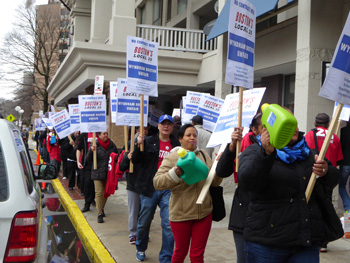
Vol. 79/No. 16 May 4, 2015
—ON THE PICKET LINE—
Maggie Trowe, Editor

Militant
Help make this column a voice of workers’ resistance!
This column is dedicated to spreading the truth about the labor resistance that is unfolding today. It seeks to give voice to those engaged in battle and help build solidarity. Its success depends on input from readers. If you are involved in a labor struggle or have information on one, please contact me at 306 W. 37th St., 13th Floor, New York, NY 10018; or (212) 244-4899; or themilitant@mac.com. We’ll work together to ensure your story is told.
— Maggie Trowe
Illinois uranium workers return to work after eight-month lockout
After being locked out for nearly eight months, workers at Honeywell’s uranium conversion facility in Metropolis, Illinois, began returning to work April 20 after ratifying a three-year agreement March 27.“The new contract is a vast improvement over Honeywell’s initial offer,” United Steelworkers Local 7-669 President Stephen Lech told the Militant, “but we didn’t get everything we wanted.”
Honeywell locked out about 150 members of Local 7-669 Aug. 1, 2014, after only 11 days of negotiations for a new agreement.
In June 2010 Honeywell also locked out the Steelworkers, who turned the lockout into a fight — organizing around-the-clock picketing and reaching out to the labor movement nationally and internationally for solidarity.
The unionists returned to work in August 2011 after beating back the company’s most onerous takeback demands.
Talks between Honeywell and the union, which stalled twice during the most recent lockout, resumed March 18. Three days later the Federal Mediation and Conciliation Service announced a tentative agreement.
“One gain we made was making it harder for them to contract out work while our members are laid off,” said Lech. “Before, a laid-off worker could be recalled only to their old job. The company used this provision to subcontract out work when we had members laid off. We eliminated that. Now any unfilled positions have to be offered to laid-off workers before they can be contracted out.”
One of the changes in the new contract is on health care, Lech said. Local 7-669 was the last Honeywell facility in the country that was not covered by the health care plan the company offered to salaried employees, a plan with much higher out-of-pocket expenses.
In exchange for accepting this plan, members receive a $500-a-year payment into employee health savings accounts, long-term disability coverage and education assistance, said Lech.
The other thing the union conceded was the company’s ability to contract out maintenance work, said Lech. “Honeywell demanded the elimination of the maintenance department. But we won protection for our members.”
Anyone who is eligible for retirement in the next three years can retire now with full retirement pay and benefits, he said, and any maintenance worker who wants to continue working can do so in production departments.
—R.V. Smallwood
Boston hotel workers campaign for union representation
BOSTON — More than 100 members of UNITE HERE Local 26 and supporters, some shaking homemade detergent-bottle maracas, picketed outside the Wyndham Boston Hotel April 10 to support workers there in their campaign for union representation.Local 26 announced “a public campaign to win respect and a fair process to decide on unionization.”
“We are fighting for justice,” Blanca Arroyo, a kitchen worker, told the Militant. “They don’t respect our rights.”
Local 26 members from other hotels and campuses, including the Park Plaza Hotel, Le Meridien Hotel and Northeastern University, joined the picket line after work. Workers from the Back Bay Hilton, where a unionization campaign began with a picket line March 30, also came to show their support.
Local 26 announced April 11 that after a two-year campaign, workers at the Harvard-owned DoubleTree Suites have won the fight for a union and will begin negotiating their first contract. On Nov. 20, 2014, DoubleTree workers conducted their first hotel strike in Boston in more than 100 years.
— Kyle Dunphy
Related articles:
April 15 protests: ‘Stand together for $15, union’
Marches in over 200 cities in US, abroad
2 killed in Omaha explosion while cleaning oil residue from rail car
Walmart workers join ‘Fight for $15’ actions
Oil strikers protest at boss’ conference in Texas
DC Militant Labor Forum takes up fight for rail safety
‘Tinder of discontent begins to pile up, a spark can light it’
Front page (for this issue) | Home | Text-version home